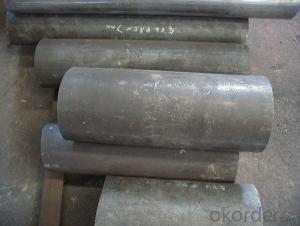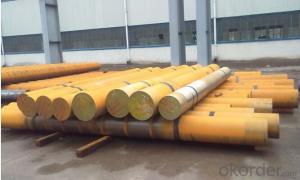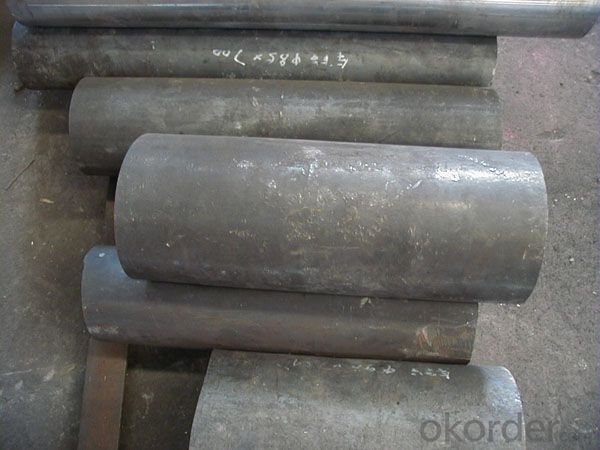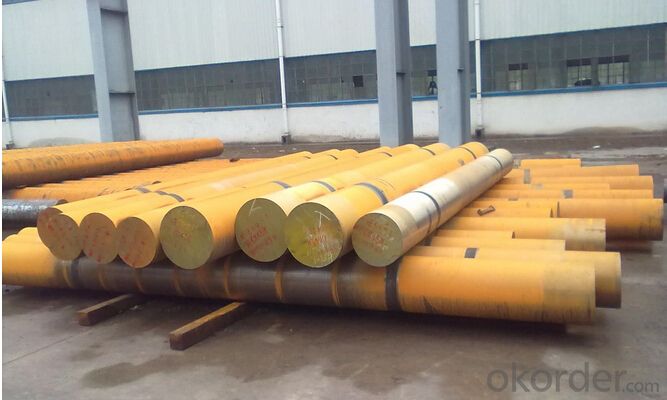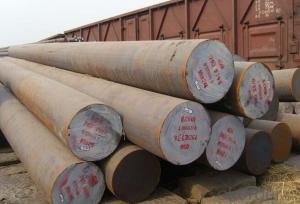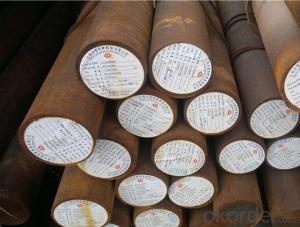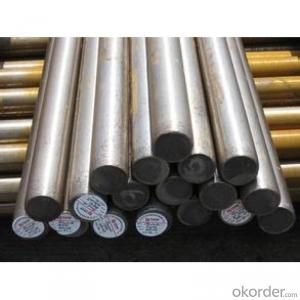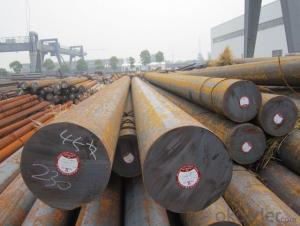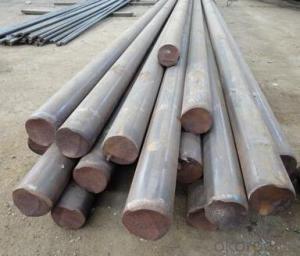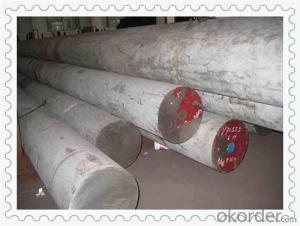Special Steel SAE 1050 Carbon Steel Steel Round Bar
- Loading Port:
- China main port
- Payment Terms:
- TT OR LC
- Min Order Qty:
- 25 m.t.
- Supply Capability:
- 10000 m.t./month
OKorder Service Pledge
OKorder Financial Service
You Might Also Like
Specification
The details of our Steel
1. Produce Standard: as the GB, AISI, ASTM, SAE, EN, BS, DIN, JIS Industry Standard
2. Produce processes: Smelt Iron -EAF smelt Billet - ESR smelt Billet -Hot rolled or forged get the steel round bar and plate
3. Heat treatment:
Normalized / Annealed / Quenched+Tempered
4. Quality assurance:
All order we can received Third party inspection, You can let SGS, BV,.. and others test company test and inspect our products before Goods shipping.
Product information
| SAE 1050 Carbon Steel Price Per kg Weld Socket Carbon Steel | |||||||||||||
1.Specification of sae 1050 carbon steel | |||||||||||||
Round bar | Diameter(mm) | Length (mm) | |||||||||||
100~300 | 2000~5800 | ||||||||||||
Plate | Thickness(mm) | Width (mm) | Length (mm) | ||||||||||
20~70 | 105~610 | 2000~5800 | |||||||||||
The specification can be customised! | |||||||||||||
2.Chemical compositon of sae 1050 carbon steel | |||||||||||||
NO. | C | Mn | Si | Cr | Cu | Ni | P | S | |||||
sae 1050 carbon steel | 0.47~0.55 | 0.50~0.80 | 0.17~0.37 | ≤0.15 | ≤0.25 | ≤0.30 | ≤0.035 | ≤0.035 | |||||
3.Delivery condition of sae 1050 carbon steel | |||||||||||||
σb (MPa): ≥630(64) | σs (MPa): ≥375(38) | δ5 (%): ≥14 | Akv (J): ≥31(4) | ||||||||||
αkv (J/cm²): ≥39(4) | ψ (%): ≥40 | Hardness: HB180~220 | |||||||||||
4.Heat treatment of sae 1050 carbon steel | |||||||||||||
Acc. to your request, Standard steel bar(sawing) , non standard steel bar(sawing) or Mill deliver condition,without sawing or cutting,Conventional or ESR, hot rolled or forged, black surface or milling, Hardness: annealed to HB≤207. | |||||||||||||
1.EAF: Electric Furnace+LF+VD(Optional) | |||||||||||||
5.Characteristic of sae 1050 carbon steel | |||||||||||||
(1) Higher strength in a high-quality carbon steel. | |||||||||||||
(2) Mechanical properties of this steel is very good. | |||||||||||||
(3) due to poor hardenability, general normalized state, high mechanical performance requirements, the use of quenched and tempered. | |||||||||||||
(4) Moderate in cold plastic deformation, the machinability by annealing and normalizing is better than quenched and tempered. | |||||||||||||
6.Application of sae 1050 carbon steel | |||||||||||||
(1) used in the manufacture of high wear resistance is required. | |||||||||||||
(2) For the machining parts and spring pieces with little dynamic and impact loads, such as forging gear, rod, roll axis, friction plate, agricultural earthmoving plowshare, heave-duty spindles etc. | |||||||||||||
Main product
High speed steel | |
AISI | M2,M4,M35,M42,T1 |
DIN | 1.3343,1.3243,1.3247,1.3355 |
JIS | SKH51,SKH54,SKH35,SKH59,SKH2 |
Cold work tool steel | |
AISI | D2,D5,D3,D6,A8,A2,O1 |
DIN | 1.2379,1.2601,1.2080,1.2436,1.2631,1.2363,1.2510,1.2327 |
JIS | SKD10,SKD11,SKD1,SKS3 |
Hot work tool steel | |
AISI | H13,H11,H21 |
DIN | 1.2344,1.2343,1.2367,1.2581,1.2713 |
JIS | SKD61,SKD6,SKD7,SKD5SKT4 |
Plastic mould steel | |
AISI | P20,P20+Ni,420 |
DIN | 1.2311,1.2738,1.2083,1.2316 |
JIS | PDS-3,SUS420J1,SUS420J2 |
Alloy structural seel | |
AISI | 5140,4340,4135,4140 |
DIN | 1.7035,1.6511,1.7220,1.7225 |
JIS | SCr440,SNCM439,SCM435,SCM440 |
Stainless steel | |
AISI | 440C,420,430 |
DIN | 1.4125 |
JIS | SUS440C |
Carbon steel | |
AISI | 1045,1020 |
DIN | 1.1191 |
JIS | S45C, G3101 |
Product show

Workshop show

Shipping
1. FedEx/DHL/UPS/TNT for samples, Door-to-Door;
2. By Air or by Sea for batch goods, for FCL; Airport/ Port receiving;
3. Customers specifying freight forwarders or negotiable shipping methods!
Delivery Time: 3-7 days for samples; 5-25 days for batch goods.
Payment Terms
1.Payment: T/T, L/C, Western Union, MoneyGram,PayPal; 30% deposits; 70% balance before delivery.
2.MOQ: 1pcs
3.Warranty : 3 years
4.Package Informations: 1) EXPORT, In 20 feet (GW 25 ton) or 40 feet Container (GW 25 ton)
2)as customer's requirement
Why choose us?
(1) The leading exporter in China special steel industry.
(2) Large stocks for various sizes, fast delivery date.
(3) Good business relationship with China famous factories.
(4) More than 7 years steel exporting experience.
(5) Good after-sales service guarantee.
- Q: Can special steel be used for making cutting tools?
- Yes, special steel can be used for making cutting tools. Special steel, also known as tool steel, is specifically designed and manufactured to have excellent hardness, wear resistance, and toughness properties, making it highly suitable for cutting tool applications. The unique composition and heat treatment processes of special steel enable it to withstand high temperatures and maintain sharp cutting edges, ensuring efficient and durable performance for cutting tools.
- Q: What are the challenges in casting special steel?
- Some of the challenges in casting special steel include achieving the desired chemical composition and metallurgical properties, ensuring proper fluidity and mold filling, controlling shrinkage and porosity, dealing with high melting temperatures, and managing the presence of alloying elements and impurities. Additionally, the complex and intricate designs of special steel components can pose challenges in achieving accurate and defect-free casting.
- Q: What are the main characteristics of spring steel?
- Spring steel is a type of high-carbon steel that is specifically designed to possess excellent elasticity and resilience. It is primarily known for its ability to return to its original shape after being bent or deformed, making it ideal for applications where repeated and controlled deflection is required. The main characteristics of spring steel include: 1. High Yield Strength: Spring steel is characterized by its high yield strength, which refers to the amount of stress it can withstand before permanent deformation occurs. This allows it to bear heavy loads and resist bending or breaking under pressure. 2. Excellent Elasticity: One of the most significant characteristics of spring steel is its exceptional elasticity. It can be flexed, twisted, or stretched without permanently deforming, and once the force is released, it returns to its original shape. This property is crucial for applications requiring constant and repetitive motion. 3. Superior Fatigue Resistance: Spring steel is exceptionally resistant to fatigue, meaning it can endure millions of cycles of stress without failing. This characteristic is crucial for products subjected to continuous and repetitive loads, such as springs in automotive suspensions or industrial machinery. 4. Good Hardness and Wear Resistance: Spring steel is typically hardened to enhance its wear resistance. This allows it to withstand abrasion and deformation under harsh conditions, making it suitable for applications that involve friction or impact, such as cutting tools or automotive components. 5. Excellent Formability: Spring steel can be easily formed into various shapes and sizes, making it highly versatile for different applications. It can be cold-drawn, rolled, or heat-treated to achieve specific mechanical properties, allowing manufacturers to customize its characteristics based on their specific requirements. Overall, the main characteristics of spring steel are its high yield strength, excellent elasticity, superior fatigue resistance, good hardness and wear resistance, and exceptional formability. These qualities make it a vital material in a wide range of industries, including automotive, aerospace, construction, and manufacturing.
- Q: How does special steel contribute to the corrosion resistance of products?
- By incorporating specific alloying elements, special steel enhances its ability to withstand corrosion and contributes to the corrosion resistance of products. These alloying elements, such as chromium and nickel, create a protective layer known as a passive film on the steel's surface. This passive film acts as a barrier, preventing the penetration of oxygen and moisture to the underlying metal, thus reducing the chances of corrosion. Special steel contains high levels of chromium, which enables the formation of a dense and stable chromium oxide layer on the surface. This layer acts as a physical barrier, preventing the diffusion of corrosive agents and inhibiting rust formation. Additionally, the presence of nickel in the alloy further improves the steel's corrosion resistance by promoting the formation of a more uniform and adherent passive film. Furthermore, special steel can undergo specific treatments or processes to enhance its corrosion resistance. Techniques like heat treatment and surface coating can modify the steel's structure and composition, facilitating the formation of more stable passive films and reducing susceptibility to corrosion. These treatments also improve the steel's mechanical properties, making it more durable and resistant to external factors that may lead to corrosion. In conclusion, the utilization of special steel in various products enhances their resistance to corrosion through the incorporation of alloying elements and the application of specific treatments that encourage the formation of protective passive films. This, in turn, extends the lifespan of the products and ensures their performance and integrity, even in harsh and corrosive environments.
- Q: How does special steel contribute to the manufacturing of springs?
- Special steel contributes to the manufacturing of springs by providing specific mechanical properties that are crucial for their functionality. The unique composition and heat treatment of special steel ensure excellent strength, durability, and elasticity, allowing springs to efficiently store and release energy. Additionally, special steel's resistance to corrosion and fatigue enhances the lifespan and reliability of springs, making them suitable for various applications in industries such as automotive, aerospace, and machinery.
- Q: How does special steel contribute to the automotive engine industry?
- The automotive engine industry relies heavily on special steel, which offers exceptional strength, durability, and performance to various engine components. Special steel's distinctive characteristics make it an ideal choice for manufacturing crucial parts like crankshafts, connecting rods, camshafts, valves, and cylinder liners. One significant advantage of special steel in the automotive engine industry is its remarkable strength and ability to withstand high temperatures. Engine components face intense heat and pressure, but special steel alloys are specifically designed to maintain their structural integrity and functionality under extreme conditions. This durability improves engine efficiency, reliability, and longevity. Additionally, special steel's superior mechanical properties, such as high tensile and impact strength, allow for the production of lighter yet stronger engine components. By reducing the weight of these parts, special steel helps enhance fuel efficiency and reduce emissions, making it an environmentally friendly choice for automotive manufacturers. Special steel also enables the production of more intricate and precise engine components. Its excellent machinability and formability allow for intricate designs, tighter tolerances, and improved performance. This contributes to the overall efficiency and power output of the engine. Furthermore, special steel's corrosion resistance properties are crucial in preventing engine components from deteriorating over time. Its ability to resist rust and other forms of corrosion ensures that the engine operates optimally for an extended period, reducing maintenance costs and improving overall performance. Overall, special steel's unique properties, including strength, durability, heat resistance, and corrosion resistance, make it an essential material in the automotive engine industry. Its contribution lies in providing superior performance, efficiency, and longevity to critical engine components, ultimately enhancing the overall driving experience for consumers.
- Q: Can special steel be used in the automotive racing industry?
- Yes, special steel can be used in the automotive racing industry. Special steel alloys, like high-strength steels or heat-resistant steels, are commonly utilized to enhance performance, durability, and safety in racing vehicles. These specialized steels offer superior strength-to-weight ratios, improved mechanical properties, and resistance to extreme temperatures, making them ideal for various automotive racing applications such as chassis, suspension components, engine parts, and exhaust systems.
- Q: How is alloy steel different from carbon steel?
- Alloy steel differs from carbon steel in that it contains additional elements, such as nickel, chromium, or molybdenum, which enhance its strength, hardness, and corrosion resistance. This makes alloy steel more suitable for applications that require high performance and durability, while carbon steel is typically used for general-purpose applications.
- Q: What are the different carburizing techniques used for special steel?
- There are several carburizing techniques used for special steel, including pack carburizing, gas carburizing, and vacuum carburizing. Pack carburizing involves placing the steel in a container with a carbon-rich material, such as charcoal or coke, and heating it to high temperatures. Gas carburizing involves introducing a carbon-rich gas, such as methane or propane, into a furnace where the steel is heated. Vacuum carburizing utilizes a low-pressure atmosphere to introduce carbon into the steel at high temperatures. Each technique has its own advantages and is chosen based on factors such as desired depth of carburization, time constraints, and the type of steel being treated.
- Q: What are the applications of high-speed steel?
- High-speed steel (HSS) finds numerous applications due to its exceptional combination of hardness, toughness, and heat resistance. It is extensively used in cutting tools, such as drills, end mills, and lathe tools, enabling efficient machining of various materials, including metals, plastics, and wood. HSS is also employed in forming tools, such as taps and dies, where it can withstand the high pressures and temperatures involved in metalworking processes. Additionally, HSS is utilized in saw blades, milling cutters, and gear cutters, enhancing their durability and performance. Its versatility and reliability make high-speed steel a crucial material in various industries, including manufacturing, automotive, aerospace, and construction.
Send your message to us
Special Steel SAE 1050 Carbon Steel Steel Round Bar
- Loading Port:
- China main port
- Payment Terms:
- TT OR LC
- Min Order Qty:
- 25 m.t.
- Supply Capability:
- 10000 m.t./month
OKorder Service Pledge
OKorder Financial Service
Similar products
Hot products
Hot Searches
Related keywords
